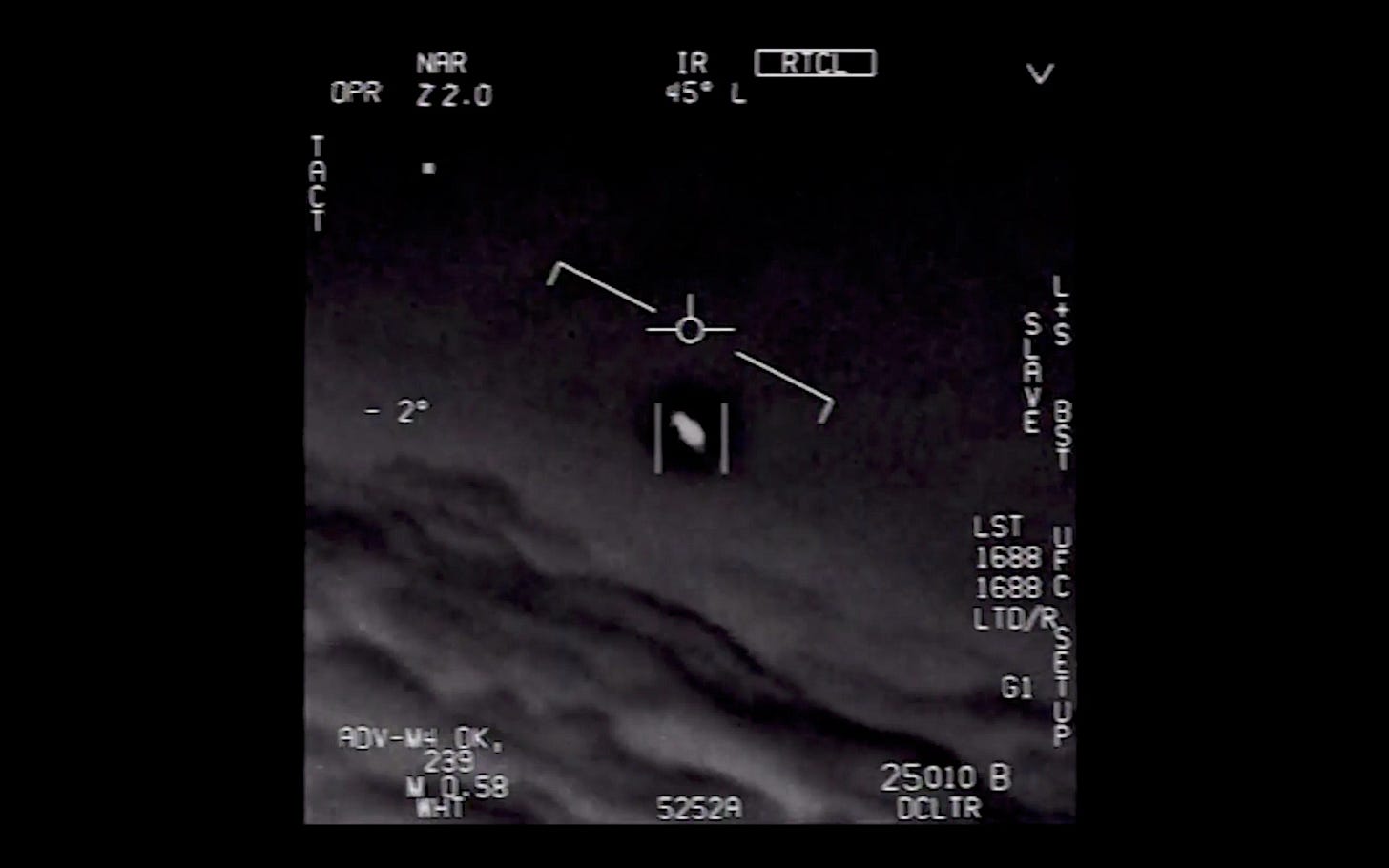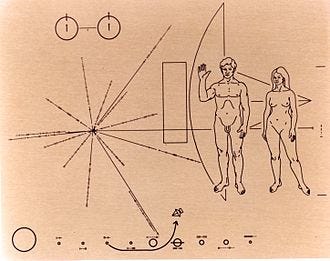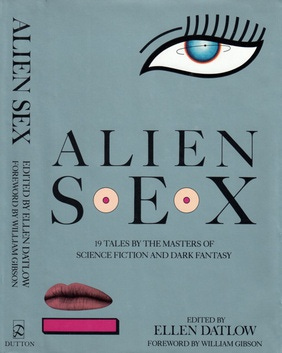What We're Talking About When We're (Not) Talking About Extraterrestrials
Our culture's complicated relationship with the Great Other
First, let me clarify where I stand: I’m not writing this from the point-of-view of a “believer” or a “debunker.” I’ve been writing science fiction stories for a long time, and I’m quite aware of the difference between fiction, speculation and fact. Think of me as an open-minded layman. My agenda here, if any, is to keep all options open — and not play favorites…
1. A Love-Hate Relationship?
I think most people can agree on this: The 1996 “alien invasion” movie INDEPENDENCE DAY is impossible to take seriously. It’s too crude a vision of alien contact — too illogical, too jingoistic, and far too destructive. And the aliens in the movie are very dumb, because the plot demands it.
INDEPENDENCE DAY (1996). Did Roland Emmerich think that aliens who can travel to another star are this dumb? Or did he assume the movie’s audience was dumb? Or did the movie “dumb it down” for some other reason?
If technologically superior, sinister aliens really wanted to seize Earth as a precious resource, then they would not want the planet destroyed in the process. The same goes for our infrastructure: Alien invaders would not want our nuclear power plants, oil fields, cities and industries to burn up and pollute the Earth more than has already been done.
They would instead try to exterminate humanity as delicately as possible … probably with directed chemicals, programmed germs, nanobots, or some other very small, sneaky weapon that spares the environment. (It would probably also be a lot less costly to produce than blowing up cities.)
A particularly terrifying example of “sneaky genocide” is the alien scheme in Alice B. Sheldon’s “The Screwfly Solution” (1977), which was adapted as an episode in the TV series Masters of Horror (2006).
THE SCREWFLY SOLUTION (1977, TV adaptation in 2006)— this is as dark as science fiction gets. A gut-punch of a story. It can be read as an allegory about misogyny, but also works as “hard” SF. The premise is based on a view of humans as biologically hardwired, unable to escape their basic programming — even if it becomes fatally compromised…
A recurring theme in invasion stories is that an individual alien visitor becomes isolated from the “main force” and has an extended stay on Earth — by accident or as an agent — and learns to appreciate humanity.
Notable examples are John Carpenter’s STARMAN (1984), or the comedy TV series RESIDENT ALIEN (2021). The typical plot is that even though these isolated visitors are intellectually superior to humans, they can learn something from us that their civilization lacks, or has forgotten (compassion, friendship, love, a sense of purpose in life, etc.). In other words, the message is: If we can make the aliens become more like us — at least emotionally — we may find a state of peaceful coexistence.
(Side note: How come there are so few stories where a “resident alien” teaches humans to become more like itself, and to behave/think less like humans? The most notable example might be Robert A. Heinlein’s controversial cult novel STRANGER IN A STRANGE LAND (1961). But I think most people find the idea of humans “becoming like aliens” instinctively repulsive.)
What we can take seriously is what these fictions reflect: Humanity has deeply ambiguous feelings about discovering other intelligent life in the universe. The fact that there are so many of these stories indicates that we do think about the subject as more than just fantasy.
We seem to both long for alien contact and fear it.
The (conspicuously autistic) alien visitor in STARMAN (1984) learns to love, but never becomes completely human — he cannot remain on Earth, and eventually returns to the stars. This science fiction trope seems related to ancient myths about gods who descend to Earth and mate with humans to spawn heroic demigods (see Hercules and Theseus). The movie E.T. - THE EXTRA-TERRESTRIAL (1982) borrows more from Christianity; E.T. is obviously a Christ-like figure.
2. In This House, We Believe in Bloodletting and Miasma
But wait — what do I mean by “we”? I mean the public, who willingly buy these stories. I count myself as a member of said public. We “normies” seem far more willing to accept the possibility of aliens — and openly talk about it — than our supposed intellectual superiors, those supposedly “in the know.”
If there is an “Overton window” (a narrow, shifting area of respectable opinions) then the existence of alien intelligence is still on the outside of that window, trying to get in. There are gatekeepers who keep the subject disrespectable (arguably, some of the “true believers” are doing pretty much the same job).
Although I’m basically an open-minded skeptic, I’ve been struck by the psychology of denying the possibility of alien life. It often presents itself with a veneer of the most severe rationality, but something else shines through.
Let me be crystal clear here: Even if authority figures who deny that UFOs can be evidence of extraterrestrials were objectively correct, even if they were being honest and based the denial on available evidence (which isn’t much at all to go on), there is still a tangible psychology behind the superficial, insistent denials.
It’s not just about evidence. It’s a mindset.
Granted: nobody wants to look like a fool. No one wants to be duped. Especially in this age of deepfakes. The “socially safe” bet is to deny even the possibility — especially since we know so little. UFO believers can be, and are, duped. And then they look like gullible fools.
Full disclosure: When I was a kid, once I repeatedly threw a plastic plate into the air nearby a road, just to see if that would make observers in passing traffic think they saw a UFO. If one mischievous boy could do that, then legions of others could. So this kind of photo doesn’t prove anything. You need much more than that. (Sorry.)
(Photo source: Wikipedia)
But even so:
I think we really ought to be more open-minded on the subject precisely because we know so little about alien life. Smugness does not become science and does not encourage objectivity.
Having no data about a subject doesn’t mean you’re educated about it. It means you know nothing about it. You, gentle reader, know about just as much about extraterrestrial intelligence as myself, Neil DeGrasse Tyson, or every Nobel Prize winner ever: nothing.
There is an annoying arrogance about scientists who casually dismiss all UFO reports, while good money is being spent on radio telescopes and space probes that so far have come up with nothing. It’s as if they’re saying between the lines: You uneducated laymen are naive about this. The discovery of aliens is so unbelievably unlikely that only we, the experts, can possibly pull it off.
Yeah, I suppose they would. You know, like Western physicians discovered vaccination before anyone else … except that they didn’t. Or the way geologists discovered continental drift first, since obviously they were the experts … except that they didn’t.
Or consider the esteemed British astronomer Richard van der Riet Woolley, who said this about space travel to Time Magazine in 1956:
"It's utter bilge. I don't think anybody will ever put up enough money to do such a thing . . . What good would it do us? If we spent the same amount of money on preparing first-class astronomical equipment we would learn much more about the universe . . . It is all rather rot"
A Ukrainian postage stamp, commemorating the successful 1957 launch of what the astronomer Richard van der Riet Woolley called “utter bilge,” A.K.A. Sputnik. He didn’t get his own stamp. (Source: Wikipedia)
Sometimes experts excel at ignorance in their own field.
I’m not just being sarcastic, not just calling out arrogance: Do we even know what to look for? (J. Michael Godier made a fascinating video on that subject.) This is a serious challenge. Since we probably haven’t spotted any certain, physical aliens yet, or what their “stuff” really looks like, we may be looking in the wrong directions.
Enrico Fermi’s famous question remains unanswered: “But where is everybody?”
Perhaps we need to study intelligence in other Earth animals, to get an idea of what alien behavior and communication might be like. (This has, to some extent, already been tried.)
At its extreme, the denial of the possibility of aliens comes close to a religious worldview: The inability to admit we may not be alone in the universe because that admission breaks some unspoken taboo. What, precisely, is the taboo?
3. Plausible Deniability
The leaked military video clip which by now has been seen by everyone. You can hear a pilot say that there are more of “them” than is shown on camera. The video clip — if it’s genuine — may have been edited so as to make it easier to dismiss it as a misinterpretation or video glitch.
In recent years it’s been made public that the U.S. military indeed does UFO research, and that it’s very reluctant to make any public admissions about it.
There’s something schizophrenic about the military both spending money on studying UFOs, while denying that anything weird they find might exist or be beyond their understanding. Secrecy is one thing, but… this is another kind of secrecy. It’s inconsistent, and not entirely logical.
Take that bizarre testimony before the U.S. Congress with David Grusch in 2023. What he claimed sounded just… ludicrous. I got angry; he was insulting our intelligence.
Purely personal observation: Why does the song “Mista Dobalina” play in my head when I see this guy?
The Vatican has been involved, you say? And Mussolini? Pull the other one! I immediately began to suspect the Grusch hearing was staged. My spontaneous thoughts:
1. Has his mind snapped?
2. Is someone feeding him deliberately ridiculous bullshit, as part of some cover-up?
3. Is this man lying consciously?
4. Is he a patsy?
5. One way to avoid scrutiny is to wrap real secrets in claims that are so silly and over-the-top, the public will just reject the whole bundle out of hand. Was that the intent?
6. Was this media circus really necessary to keep the public’s attention away from classified business? Surely there are less embarrassing ways. Nobody wants to look like a fool. Grusch made the Pentagon look foolish by association.
7. What if it’s all a psy-op? The leaked UFO videos, the pretense of having something to hide, the whole show. What better way to unite a divided nation, than to invent an alien threat? (Such a scheme was proposed in the 1974 novel Wild Card.)
8. If this stuff is so tip-top secret, why is this man even being allowed to say it?
9. Where is your evidence, Grusch?
10. Where is the effing evidence?
But what if Grusch isn’t the only military mind who might have snapped?
I’m particularly intrigued by the following testimony from the much-publicized Luis Elizondo. He says he met institutional resistance while he was studying UFO reports at the Pentagon … but not always because of rational informed skepticism. Apparently, some of the resistance springs from old-fashioned superstition:
“Someone stopped me in the halls of the Pentagon and said, ‘Have you read your Bible lately?’ And I was kind of surprised by the question. ‘I know what the Bible says. What, may I ask specifically, do you mean?’ He says, ‘You know, what we’re dealing with are our demons. These are demonic beings. And we shouldn’t be looking at them.’”
(“Confessions of a UFO Hunter”, NewsNation, 2024)
Don’t overthink the precise words in that quote. Think of the emotions behind them. A grown man, a trained military officer, states his fear that supernatural evil has physically manifested in our world. And he works inside The Pentagon.
If that man in Elizondo’s anecdote had said that the Chinese or the Russians were demonic beings, then I’d conclude he was simply psychotic, or tripping over his own overheated rhetoric (as people sometimes do). A human enemy is still a human. But a UFO is, by definition, the unknown. So some would grasp for religious imagery to make sense of it … or far-fetched conspiracy theories involving the Vatican.
Behind the official reassurances, behind the boiler-plate denials, behind the secrecy we can glimpse real fear and insecurity. Not fear of the known, but the unknown.
The military mindset is different from the scientific, in that the unknown is framed as a potential military threat. A rational, intelligent general would not casually dismiss even weak evidence of a potential vast threat.
So an officer inside the Pentagon who talks about UFOs as “demonic beings” which must be avoided, is in a mental realm beyond rationality. He may have vaguely perceived something that seems very dangerous and impossible to defeat by military means. And his stated reaction is, to put it bluntly, a defeat of morale. Soldiers are trained to suppress cowardly impulses.
Would a military commander publicly admit that he’s afraid of UFOs because they may be indications of something invincible? Sounds like a career killer.
Would the military open fire on aliens? (Would they dare to?) Image from THE DAY THE EARTH STOOD STILL (1951).
For scientists, the “threat” in UFOs isn’t military, but to the personal sense of “identity” and status. Modern science is supposed to be the highest authority on truth. Any observable phenomenon not yet understood or quantified is a scientific challenge — and requires the humility to admit one’s ignorance.
In the UFO community, you may come across a different kind of smugness — that of the ones who think they already know “the truth.”
4. We Come In Peace And Bring You Healing Crystals
The famous Nazca lines and geoglyphs in Peru seem designed for an observer located high above. This has fostered speculation that the figures were an attempt to communicate with the gods. Recently, even more such giant figures have been discovered in the region. Compare this fantastic work of art with the messages attached to the Pioneer and Voyager space probes. Is it all for the exact same psychological purpose? (CC photo source: Diego Delso)
As I mentioned earlier, we seem to both long for and fear the coming of extraterrestrials. The “longing” part is a typical stance among explicit UFO believers (though many are also concerned about aliens with sinister motives).
The assumption of the more starry-eyed variety of UFO believers is that superior aliens are benevolent saviors or observers. This is not supported by evidence (since we don’t have any). So the assumption is more akin to a belief.
Steven Spielberg’s movies CLOSE ENCOUNTERS OF THE THIRD KIND (1977) and E.T. - THE EXTRA-TERRESTRIAL (1982) are the most successful pop-culture works inspired by the UFO movement in American culture. They carry a very clear message: The government knows about alien visitors but are trying to cover it up; the benign aliens can bring us their superior wisdom and/or spiritual elevation. (The religious overtones in both movies are not exactly subtle.)
CLOSE ENCOUNTERS OF THE THIRD KIND (1977) depicts UFO hunting as Modern Man’s spiritual quest — basically PILGRIM’S PROGRESS (1678) for Baby Boomers. What’s quite odd about this movie is that once the aliens finally show up, it’s an anticlimax. The plot stops dead; Spielberg doesn’t really know what to do with the aliens. So they just hang around for short while, play a “jam session” with a human musician, drop off some abductees, pick up the protagonist … and split. Hey! Where’s that spiritual elevation we were hoping for?
UFO belief has a New Age aspect to it; this has been pointed out many times, and there’s truth to it. There are obviously people — though far from all UFO believers — who vaguely think of aliens as akin to angels, and space as the “heaven above.”
The most extreme expression of such beliefs came when the space-oriented cult Heaven’s Gate committed a collective suicide in 1997. The cultists had no evidence to justify their actions, just the promises of their delusional cult leaders — and their deep longing for escape. The name of the cult is the clue: They sought a kind of secular paradise.
I’m certain that most UFO believers would never go this far. And it is socially “safe” to believe in alien visitors — even alien abductions — without firm evidence, as long as it remains a personal interest without political or scientific ramifications. And it’s definitely safe if you have no “high” status to lose. Don’t make too much of a fuss about ETs, and you won’t lose your job or be shunned.
You can also make some money from UFO belief. It may not bring you an invitation to high society, but it definitely can pay off. Just ask Erich Von Däniken.
Erich Von Däniken’s CHARIOTS OF THE GODS? (1971) — a pseudoscience book that proved enormously popular, and is the “ancestor” of TV shows like ANCIENT ALIENS. Von Däniken speculated that wise, paternalistic alien visitors — mistaken for gods by our dumb ancestors — are humanity’s guides and benefactors. This is juvenile stuff, straight out of a comic book. Von Däniken’s “secret sauce” was his understanding that if you don’t take yourself too seriously, you can get away with a tall tale.
Some personal opinion:
Is it “wrong” to believe that aliens are already here, or have been here in the distant past? The wrong is in the lack of solid proof. Perhaps something is here, and we call it “UFOs” or “aliens” because those are the words we have to describe “it.”
(What is “it”? If I knew that, I wouldn’t have written this essay.)
Would it be better to know, rather than to believe? The thing is, as long as the UFO subject remains outside the “Overton window,” little serious — i.e. costly — research into possible alien visitors will be made. The Ancient Aliens TV show and Erich Von Däniken’s imitators are not helping; they are deterring scientists who otherwise might dare to examine the subject closer.
I’m only critical of UFO belief if it suppresses or ignores what is truly needed to get any further in the issue: Humility, genuine curiosity, open-mindedness and intellectual rigor.
5. High Stakes
What are the stakes of SETI (Search For Extraterrestrial Intelligence)? Who gains? Who loses?
It interests me how little public debate there is about these stakes. We can talk about the inherent dangers of war, pollution of the environment, or technology — with great seriousness! — but you would never hear a politician, a pundit or a journalist talk about the inherent risks/promises of alien contact in any depth.
Barack Obama has flirted with the issue — cautiously. He praised the Three-Body Problem novels. But he keeps an ironic distance when the question of aliens comes up. (Again: nobody wants to look like a fool.)
For humanity as a whole, the stakes are our survival as a species. Do I need to elaborate on why? (No, really — do I?)
Blaise Pascal famously made a wager about the possible existence of God: He reasoned that even if God’s existence could not be proved through reason, the stakes were such that if God is real, the potential gain of belief is immeasurable.
(Caveat: This “wager” seems crass and opportunistic. Perhaps God would judge that Pascal was a shallow jerk, and damn him anyway? Just kidding!)
The possibility of intelligent aliens is like a variation on Pascal’s Wager: Even if we never find evidence of their existence, the possible risk (or gain?) is extreme.
If you assume they do exist and you are wrong, you’ll lose nothing — except maybe social status. (Given the size of the universe, disproving the existence of aliens isn’t easy; I think it’s nigh-impossible.)
If you assume they don’t exist and it turns out they do, there is a possible existential risk that we have deliberately ignored.
Shameless Product Placement: In my short story “Message From a Cage” (featured in the book A MAN CALLED MISTER BROWN AND OTHER STORIES (2021)), those elusive aliens finally show themselves on Earth. The narrative deals with how one particular subculture reacts to this huge event: Science fiction fans. Surely they, of all people, are intellectually prepared for aliens? Well, it gets … messy.
Fact: We have not yet proved the existence of intelligent aliens anywhere in the Universe, much less in the Solar System. But if they exist, and are aware of our existence, the stakes can become terribly high because:
1. If aliens can use their technology to travel to the Solar System across lightyears of space, then they are bound to be vastly more advanced — hundreds, thousands, millions of years ahead;
2. We know nothing about the psychology, motivations or ethics of vastly more advanced civilizations — any assumptions are guesswork or wishful thinking;
3. If such a civilization, for any reason, wanted to exterminate or subjugate humanity, it could do so — and we’d have little or no chance of putting up a defense.
4. Human history shows that when two civilizations clash, and one is technologically far ahead of the other, the “backward” one is put in a vulnerable, dependent position. It might pull through — then again, it might not. If it comes to blows, the “backward” party could be reduced to a position of servitude, degradation — or extermination.
5. Even if an advanced alien civilization does not visit the Solar System with any evil intent (conquest, plundering of resources, etc.), unintended negative consequences can still occur.
The most obvious one is accidental contamination by deadly alien microorganisms. European colonizers brought measles to the Americas, and that virus devastated the indigenous populations.
Other unintended consequences of alien contact:
- Culture shock
- Human “cargo cults” that waste resources on confused attempts to attract aliens (in the hope of favors / gifts / rewards / advancement)
- Earth’s superpowers go to war with each other, over a disputed claim to some alien technology
- A misplaced alien “toy” turns out to be extremely dangerous in human hands
Stephen Hawking stated clearly: If the phone rings, do not answer.
The renowned physicist-cosmologist Stephen Hawking (1942-2018) warned about the inherent risk in letting alien civilizations learn about our existence. His warning has been ignored, and this is part of a pattern: To take the potential danger seriously is a social taboo of the highest order. We are supposed to regard the Milky Way galaxy, with its hundreds of billions of stars, as if it existed for humanity alone. Is that realism, or merely navel-gazing?
(Further reading: The post “Unintended UAPs” on the blog Unintended Consequences.)
6. Mankind On A Leash
Never mind that tired old scenario of our cities being blasted to smithereens by alien death rays. Imagine us — all of us — becoming slaves to beings so far advanced that we barely understand them.
The condition of slavery is mentally damaging. Humans need dignity like they need fresh air and sunlight. If we had to bow down to alien overlords, I think it could damage us worse than being slaves to other humans — because we might become convinced that we deserved it.“They are superior to us in every way. We’ll never measure up to them. They know best and always will. Obey and smile.”
Show me a happy slave and I’ll show you a crushed human.
In John Christopher’s book series THE TRIPODS, aliens have conquered Earth and turned humanity into a slave caste. Humans are forced to live as farmers, to keep them away from technology that might challenge the alien overlords. Independent human thought is suppressed through compulsory brain implants. (Image from the BBC TV series.)
Things could always get worse … Since we may expect an evolutionary gap between humanity and the first alien civilization that finds us, it’s possible that their interest is on another level than “enslavement.” Because Homo Sapiens — once properly domesticated — would make the most charming pets. We can perform tricks. Music! Art! Sports! Comedy! “Look at my Earthlings, they are adorable! Just don’t let them near your children, they might bite.”
In the surrealistic, disturbing animated movie FANTASTIC PLANET (1973), humanity has been subjugated by giant aliens. Humans are treated as pests and pets — and yet, they eventually manage to stage a successful uprising against their masters.
If you have a pet, consider: Does it truly understand its position relative to its owner? Do you truly understand how much more intelligent than your dog you are? I think the dogs are dimly aware of a difference. Scientists now admit that “lower” animals are probably conscious by degrees.
If you were a dog, how would you regard your human master who towered over you, scratched you behind the ear and gave you treats, and controlled things you couldn’t understand? (What does a dog think a car is? Or a TV set?)
I don’t know the answers. But if aliens exist, it’s a valid thought experiment.
Of course all the above speculation comes from my own assumptions … which I’m telling myself to question also. Why assume that advanced aliens would be interested enough to travel several lightyears (at an immense cost in energy, resources and time) to come here? On what evidence?
They might just be curious. Curiosity appears to be a basic sign of intelligence. It’s hard to imagine a thinking being who lacks it. Out of curiosity, we send unmanned space probes to survey other worlds, so it’s not irrational to assume aliens might do so. Whether that then leads to something “more” is anyone’s guess.
It makes sense that our first contact with aliens would not be with organic life forms but inorganic objects: space probes, robots or other objects sent to survey the galaxy. They could be very old — or so ancient that they have survived the civilization that built them.
It has been speculated that the interstellar object Oumuamua might have been a passing alien space probe.
Several scientists have rejected this hypothesis. (What, a civilization building very expensive machines to survey other planets? Preposterous. Why would anyone waste resources on such a futile project? I suppose these imaginary aliens might also put a plaque with a “Hello” message on their probes, and include nudes of themselves, in the vain hope that someone might find that in the vastness of space? Utter bilge.)
Oumuamua (Source: Wikipedia)
Pioneer 10 (Source: Wikipedia)
Message on a golden plaque, attached to the Pioneer 10 and 11 space probes. The Voyager 1 and 2 probes contain golden records with stored information about Earth and humanity. Beneath the purpose of scientific exploration hides deep human yearnings, that we seldom try to explain. (Compare the Pioneer plaque with the Peruvian Nazca lines. Are they made from the same human impulse?)
We could follow the grim advice of The Three-Body Problem novels and try to hide from the cosmos, shun all possible detection/contact … but clearly we’re not really doing that, either. The Chinese state has built an expensive space antenna to try and detect/communicate with potential alien civilizations. (Perhaps Cixin Liu tried to warn them. The fools wouldn’t listen.)
Why this longing to find something that might be our undoing?
The Five-hundred-meter Aperture Spherical Telescope (FAST) in China. (Hello, Trisolarians! We’re dying to meet you!) Wasn’t Cixin Liu’s message clear enough? Or is the desire to “find them” stronger than reason?
7. The Awkward, Cringe, Embarrassing Part
The late, great author Alice B. Sheldon (a.k.a. “James Tiptree, Jr.”) wrote a short story that tried to suggest why humans are so hell-bent on finding aliens. The story is titled “And I Awoke and Found Me Here On The Cold Hill’s Side” (1972). She depicted how in the future, humans become part of an interstellar community of civilizations, and freely mingle with humanoid aliens … but it gets complicated.
A 1990 anthology, containing a reprint of Alice B. Sheldon’s story “And I Awoke and Found Me Here On The Cold Hill’s Side” (1972). Note how the “artsy” book cover on this edition suggests a fragmented, abstract female face.
In this science fiction scenario, humans are biologically hardwired to be attracted to what is “exotic” in others. And what is more exotic than a humanoid from another world? So alien humanoids trigger an obsessive-compulsive behavior in humans, who get clingy and needy around them — in a way that can only end up as self-destructive. The various humanoids, who do not share this psychological quirk, react negatively to the needy, clingy humans … or cynically exploit them.
This story can still upset readers (which I have observed firsthand), and I understand why. It isn’t flattering. It paints humanity as profoundly irrational. Granted, a piece of fiction doesn’t prove that we are driven by unexamined biological impulses to find aliens. Still, it touches a nerve.
What drives us, then? The many warnings about the possible danger of alien contact haven’t been taken to heart. It’s almost as if we’re hooked on an obsession — that if aliens are real, we’ve got to make contact.
I will add to this argument another item. I’m not sure whether it proves anything, but it does say … something. You be the judge. This is the cover to the first book in a series, Ice Planet Barbarians (2015) by Ruby Dixon :
And if you’re interested … here’s the blurb:
”You'd think being abducted by aliens would be the worst thing that could happen to me. And you'd be wrong. Because now, the aliens are having ship trouble, and they've left their cargo of human women - including me - on an ice planet. And the only native inhabitant I've met? He's big, horned, blue, and really, really has a thing for me...”
The series Ice Planet Barbarians now features 21 books. Perhaps aliens exist and are observing Earth, but won’t make contact because humans are simply too cringe.
8. Don’t Rock The Boat
I’ve become aware of the tendency of a culture — any culture — to develop priesthood classes and groups who serve the priesthoods. It’s an organic, spontaneous process. Someone’s always going to try and position themselves as the middleman.
Today’s highest priesthood class is scientists — whether they like it or not, whether they want it or not. It’s not their fault that their work is so important.
Clarification: Of course the proper work of a scientist really isn’t the work of a priest. I mean here the role foisted upon scientists by a secular society in the absence of a religious authority.
Most real scientists are introverts and not into public attention. They want to focus on their work, not PR or politics. (Those scientists you see presenting popularized science in the media are the rare exceptions.)
Carl Sagan: a rare exception. (You think other scientists appreciated Carl Sagan’s efforts to popularize science? In fact, many of them resented his success.)
So a class of “middlemen” have attached themselves to the field — intellectuals, pundits, journalists, activists, politicians — and made themselves the public “spokespersons” of the scientific community, arbiters of what “is scientific” and therefore correct.
(Note: I do not count Sabine Hossenfelder as a “middleman.” She’s an actual scientist who reports scientific news, and does a good job of it. She presents science as an ongoing process, and dares to criticize her peers when they — in her opinion — are not doing their job properly. The public needs more people like her.)
These middlemen may display an inadequate grasp of science as such … since scientific work demands high intelligence, near-autistic focus, intense curiosity and demanding university degrees. But the middlemen do understand that science is important, and that therein lies authority.
Claiming to be on the “side of science” gives you leverage, even when you’re clueless about how science works. (The typical fallacy of the middleman is to present science not as a process — which it is — but as dogma.)
So when the public asks for more information about UFOs, and demands explanations, the middlemen find themselves in a peculiar and frustrating situation.
Legacy-media journalism has largely taken an opportunistic approach to UFO reporting. Journalists have known for a long time that UFO articles are popular among the public and make for sensational headlines, so they will do some reporting… up to a point. And you must cut them some slack: it’s not easy to report on a subject so lacking in hard, cold data. Even the most driven newshound has to give up when there’s nothing more to go on.
The tabloids tend to use a “wink-wink” approach in UFO reporting — with “artist’s impression” images of flying saucers, bug-eyed humanoids, and tongue-in-cheek headlines. Their not-so-subtle message between the lines is: This is exciting and fun, but we’re not saying it’s exactly true.
“Artist’s impression” alien, in the tabloid newspaper Scottish Daily Mail. It’s peculiar how often this stock character is used in news media, despite the fact that no such being has ever been photographed. (Source: Pressreader.com)
”High-status” news media do reporting on UFOs much less than the tabloids, and are more careful to guard their respectability. They will feature scientists who explain that nothing has been proved (as if we didn’t already know) and reassure the public that we’ll never get visited by alien civilizations because space is really really big … and that the supposed reports about strange sightings are the planet Venus, aircraft, or balloons, or birds. This procedure has become a predictable routine.
(About space being really, really big: it is an important point, and neither our educational system nor our “middlemen” are trying hard enough to teach the public to grasp the stupendous scale of the universe.)
But again, the major obstacle for news media is that when it comes to UFOs, journalists run out of options. Are they going to press scientists — or the military — for more evidence for or against UFOs? How has that played out before?
Put yourself in the shoes of a high-profile talking head on, say, CNN.
You’ve invited a respectable scientist for an interview, and this scientist says — with great confidence — that alien visits are so astronomically unlikely as to be impossible, and that those leaked military videos prove nothing. Are you going to argue against the scientist? Are you going to ask, “Why can’t you disprove aliens once and for all?” And risk looking like a fool?
Does a goldfish understand what’s on the other side of the glass? It glimpses a Something — vast, blurred, incomprehensible — and then forgets it. To the goldfish in the tank, we’re the UFOs.
9. You Can’t Have Both Aliens and the Status Quo
A small minority of scientists, politicians and high-profile journalists has tried to take the UFO issue to the public as a serious issue. I think they are acting out of genuine personal interest, because they are risking their reputations. (Again: Nobody wants to look like a fool.)
Real scientists cannot answer the obvious question from the public: What are those leaked military videos showing, that hasn’t been explained away as birds, airplanes, video glitches, or military prototypes?
I don’t know what this is. Neither, apparently, does the Pentagon. (Image source: NY Times)
Scientists don’t have reliable UFO data, and real scientific work requires reliable data. Measurements. Samples. Blurry photos won’t suffice. (Rumors about “UFO samples” have been circulating for decades, but so far none of these rumors have been confirmed.)
You think astronomers can watch UFOs in telescopes? Telescopes are specifically made to watch planets, stars, comets and asteroids. They cannot detect UFOs — and neither can smartphone cameras, because they are not made for that purpose. When you make a tool for finding something, you first need to know precisely what you’re supposed to search for.
Since scientists honestly don’t know what the unexplained UFOs are (unless you believe in a massive cover-up), they don’t possess the tools to look for them. But the first step would be to admit it: We’re not sure what to look for.
Many of us “normies” consider the possibility that some UFOs might be a vague indication of some kind of alien activity. We’d like to know: Yes or no? But even if society’s middlemen allow themselves to say this out loud, any extended discussion — if it’s allowed to go on long enough — is bound to touch upon a very special taboo.
For anyone with authority and a position of power — in every society on Earth — the discovery of technologically superior, intelligent aliens would be a direct social threat.
Giant alien spaceship hovering over Los Angeles, in the 1983 TV series “V” (NBC).
Let’s say, hypothetically, that a colossal alien spaceship suddenly zaps into clear view above New York, and just hovers there, without using rockets or jets. A physical proof that whoever controls that huge vessel, also controls gravity.
- You’re a respected, dedicated scientist? All your merits have now effectively become pathetic kindergarten stuff. The aliens can manipulate gravity and you can’t explain why. Next to them you’re a child.
- You’re a decorated general? All the weapons you command are now insignificant toys. The aliens could nullify your nukes without batting an eyelid (if they have eyelids). You are defenseless.
- You’re the world’s richest man? To an ancient civilization that can gather the power to travel across a galaxy, your stock portfolio means nothing. What are your rich friends going to say? (They won’t say anything. They are rushing into their doomsday bunkers.)
- You’re a powerful, charismatic politician? Kiss that power goodbye. The aliens now call the shots. All you can do is hope they take notice of you and want to delegate a crumb of their authority to you. (Fat chance — to them all humans probably look and sound the same.)
- You’re a religious leader with great influence over entire belief systems? Your followers will abandon you. (You may pretend to have a “spiritual bond” with the new overlords, but that bluff won’t last for long.)
As for the rest of us — we wouldn’t have time to gloat at our defenestrated authority figures. We’d be too busy thinking about our precarious collective future.
An actual alien contact would probably not play out like the above scenario. Personally, I would expect something much stranger, more bizarre — or more low-key — than a mile-wide spaceship. (How about this? Or this?)
In the alien invasion spoof MARS ATTACKS! (1996) the Martian invaders are like evil children, motivated by nihilistic glee. Their antics are designed to mock human authority figures: Politicians, generals and scientists are ruthlessly humiliated. The message appears to be: Aliens are a threat to the Establishment.
But the point stands: The appearance of a superior alien civilization would challenge the status and power of those at the “top” of our civilization. They could abruptly lose all standing, and that’s a terrible blow to a person’s sense of self. Which means our elites cannot be seen discussing the threat to them openly or at length … both out of status anxiety, and because saying the quiet part out loud would make them sound weird, or dumb, or mad.
Nobody wants to look like a fool.
The secret message of INDEPENDENCE DAY, then, is that our authority figures can stay in charge — even against a technologically superior menace. It’s a comfort blanket for the status quo.
The sound choice if you’re in a position of high status and power, is to not rock the boat. Don’t talk at length about aliens. Don’t linger on the subject, and above all do not let the public think too much and too seriously about it. Only in some “low-status” avenues of culture do we allow these undigested fears and longings to be expressed:
- In science fiction (too many examples to mention)
- In science fiction’s bastard sibling, pseudoscience (Von Däniken et al)
- In the horror genre, where taboo fears are processed in distorted form (H.P. Lovecraft is an outstanding example)
- … and in fictions such as [deep sigh] Ice Planet Barbarians.
Why was THE THREE-BODY PROBLEM — a grim, dark “alien invasion” epic from China — such a success? It makes a clear argument against SETI, and presents a political theory of space: “The Dark Forest” hypothesis. The author’s warning about aliens as an existential threat seems to have been respectfully received — and then forgotten. In Cixin Liu’s novel, the impulse to contact the aliens is born out of despair. Are we looking for a savior from space?
10. Who’s The Man?
The idea that UFOs and aliens can be a political taboo was brought up in the fascinating essay “Sovereignty and the UFO” (2008) by Alexander Wendt and Raymond Duvall. Their argument is deep and perhaps not easy to follow. Nevertheless, I strongly recommend you read it; it’s one of the most unusual legal arguments ever made.
A quote from the essay “Sovereignty and the UFO”:
”Our argument is that UFO ignorance is political rather than scientific. To motivate this argument, however, we first need to critique UFO ‘skepticism’ as science. Science derives its authority from its claim to discover, before politics, objective facts about the world. Since today these putative facts include that UFOs are not ETs, we have to show that this fact is not actually scientific.”
Note the word “putative:” Commonly believed or deemed to be the case; accepted by supposition rather than as a result of proof. (Source: Wordnik)
Long ago, the authority of a king was said to be have been bestowed by gods (or God). You could trust the king, because he had God on his side — and God was the highest possible authority, the “last word.”
Detail of a print from the 17th century, published during the 30 Years War. With the image of an angel, the artist cleverly suggested that the good cause was supported by the highest authority. Unfortunately, BOTH sides in the 30 Years War assumed that God was on their side — so the war dragged on. (Found on Etsy.)
The U.S. Declaration of Independence (1776) clearly states that the rights of the people are given by God. The highest possible authority is referred to twice in the opening paragraphs. :
”In Congress, July 4, 1776
“The unanimous Declaration of the thirteen united States of America,
When in the Course of human events, it becomes necessary for one people to dissolve the political bands which have connected them with another, and to assume among the powers of the earth, the separate and equal station to which the Laws of Nature and of Nature's God entitle them, a decent respect to the opinions of mankind requires that they should declare the causes which impel them to the separation.
“We hold these truths to be self-evident, that all men are created equal, that they are endowed by their Creator with certain unalienable Rights, that among these are Life, Liberty and the pursuit of Happiness.”
Now we live in a secular society. You can use the terms “Nature’s God” and ”the Creator” but it won’t matter if you don’t.
So who is the highest authority now? Why, us of course. Homo Sapiens. We are assumed to be the smartest, the most intelligent and the most powerful conscious entity in the universe. This isn’t said out loud — much — because it sounds awfully smug — and it is — but it’s what took the place of God.
Wendt and Duvall named this notion Anthropocentric Sovereignty. Any real evidence of an alien intelligence threatens to usurp the unspoken agreement that we are our own masters and nothing can lick us but ourselves.
If you really do believe in the authority of God, then aliens may not challenge our social order in the same profound manner, because God can remain the top authority above humans and aliens.
Although… then you had better also believe in an omnipotent deity who intervenes in earthly affairs. This was implied in the ending to the movie THE WAR OF THE WORLDS (1953): “After all that men could do had failed, the Martians were destroyed and humanity was saved by the littlest things, which God, in His wisdom, had put upon this Earth.”
Image from THE WAR OF THE WORLDS (1953), right before the Martians vaporize a kindly priest. If technologically superior aliens show up and bear us ill will, you may hope for a divine intervention. Bear in mind, though: No gods came to help the Aztecs, or the Incas, or the Tasmanians, or …
A power in the universe that can physically “eat our lunch” could also — if it chose to do so — nullify our legal system, our laws, our constitutions, democracy as such, and all human rights.
In fact this goes even further: One must not admit officially that alien civilizations really, physically exist — even if we had solid proof. Doing so could upend the current political foundations of our society. So it remains a taboo, to the point where we all pretend that only humanity can be the highest intelligence around.
Try to imagine a future amendment to the U.S. Constitution, created after a certified contact with aliens:
Given the presence of an ancient extraterrestrial civilization in Earth’s vicinity, immensely more powerful than all Earth’s nations combined, which has so far decided not to intervene in the governing of Planet Earth or the Solar System, our freedoms are ultimately guaranteed by the benevolence of said extraterrestrials. Our rights are in principle granted by God, but in effect by our extraterrestrial benefactors.
Absurd? Implausible? Yes. However, to claim that you have rights granted by a god is still formally acceptable — sort of. I would argue it’s a legal artifact, a courtesy — like saying “Bless you” when someone sneezes.
The moment we find aliens, or they find us, they become a political issue that affects every other issue.
The iconic “Evolution of Man” image. This is not a scientific diagram. It is a visualized creation myth. It tells the story of a logical, linear development, culminating in modern humans as the inevitable “end result” — Man, the master of the universe. (You almost never see a version with a woman at the end.) Real evolution is far messier, and we are neither the “end” nor the “purpose” of it. Also, if we take evolution seriously, life on other planets can evolve intelligence too. (Image source)
11. A Lightyear Is A Grave
Let’s say the “hard” skeptics are right: There’s just us. Only humans. If not in the entire universe, then at least in this galaxy. Interstellar travel is a pipe dream. No intelligent aliens will ever show up on our doorstep, because no thinking being can travel from star to star. (Reminder: This has not yet been proved.)
Let’s also dismiss unmanned alien space probes, to fill a loophole in the argument. There’s our space probes with our nudes and our golden LPs on them, shooting into the sterile void — and nothing more.
Harry Martinsson’s 1956 science-fiction poem ANIARA depicts outer space as a vast, lifeless void — a dead end for humanity. The characters are stranded inside a damaged spaceship and come to realize that they are truly alone. It may be a realistic vision, but what if the void can be traversed by a non-human intelligence? Isn’t it arrogant to assume that “nobody’s smarter than us” in a universe this big?
To quote Harry Martinsson: “A lightyear is a grave.” (Depressing, eh.)
Even then, something can travel between stars: life that doesn’t think. Tardigrades. Bacteria. Microscopic things that can survive in dried, frozen and spore form, and are not in a hurry. It may already have happened, millions or billions of years ago (or recently), that spores drifted on a comet or an asteroid — and landed in our atmosphere. That may have been the origin of life on Earth.
Microorganisms which originated somewhere else in the galaxy could be living inside our bodies, as parasites or symbiotes. The real aliens were the ones we carried with us all along …?
Tardigrades may end up as the true conquerors of the universe. In their dried-up dormant state, they have a better chance of surviving space travel than humans do. Such small, hardy life forms can also exist elsewhere in the cosmos. Does this tiny critter look alien to you…?
Given the way life has evolved on Earth, the dominant life forms in the rest of the universe are bound to be small, unintelligent and spreading slowly — microbes, spores, fungi, plants. This is a kind of reality that even the “hardest” of the hard UFO/alien skeptics can accept.
Of course, when most people talk about “aliens” they don’t mean microorganisms. The desire to find aliens has never really been about tiny, unthinking life forms. Those messages (and nudes) on the space probes were intended for beings who can read.
The Drake Equation.
There have been attempts to calculate the possible number of other civilizations in our galaxy — see the famous “Drake Equation.” Unfortunately there are just too many unknown factors playing into why and how civilizations emerge and survive, so the Drake Equation can produce wildly different results.
Furthermore, it’s very hard to judge what is the ”average” survival rate of intelligent life when we have only one test case. Humanity is still trying to survive both itself and possible future disasters. How many other civilizations in this galaxy have already failed to do so?
Nowadays you will find ruins of past human civilizations across the Earth. When we discover evidence of an alien intelligence somewhere in the Milky Way, it is likely to be an ancient object, ruin, or even a fossil.
Bad timing! The aliens arrive but humanity is long gone; only fossils are left. (Note how the uppermost geological layer glows from radiation — an ominous sign of our fate.) GALAXY Science Fiction magazine cover by Ed Emshwiller, 1951. (Image source: Rich Horton)
However: If one civilization should somehow manage to overcome the risks and pitfalls, and learn to master interstellar space travel, then it would own the galaxy. Whoever gets to conquer the Milky Way first, if anyone does, can make sure no one else becomes a challenger. If you already have dominion over the galaxy, then you don’t have to exterminate or invade Earth — you can just build a fence around it.
A possible answer to the question “Where is everybody?” is that they are outside, looking into the monkey cage. (This is an old trope in science fiction.)
12. We Really Do Want To Believe
The TV series AMERICAN GODS (2017) was based on the idea that gods exist, in the limited sense that they are created by human belief — and are nourished by our continued belief in them. By this narrative logic, UFOs and aliens should become “real” in the world of the series — because so many Americans obviously believe in their existence. Instead, the AMERICAN GODS showrunners decided to (didactically) depict UFOs as a paranoid lie, concocted by some sinister agent. This was a fumbling of the narrative ball, and I think the audience noticed; the series died. (Image source: Starz)
If all this unresolved tension around the possibility of aliens persists — what then? Is the issue going to wither away by itself, from lack of what the believers call “Disclosure”? Will debunkers get the last word?
You can easily observe that in modern culture, people “believe” in aliens in different ways. When Avi Loeb talks about SETI, he’s far more serious than when Erich Von Däniken talks about “ancient astronauts.” Von Däniken was probably having fun spinning a tall tale. Loeb wants to find a piece of an actual spaceship.
Many laymen people seem to think that aliens are probably/possibly real, but this conviction doesn’t register as having political consequences. It does not need “hard proof” in order to exist — and indeed the science establishment does not offer any such proof.
You could call this the basic “folk belief” in aliens.
I would make a rational distinction between the kind of “folk belief” that is expressed when someone says “UFOs are probably real, or could be real, there must be something out there” … and the kind of person who says “The government is hiding the truth about Area 51.” The “true believer” is yearning for physical proof. The folk belief doesn’t stand or fall with what might be hidden inside Area 51.
I also think of UFO pseudoscience and cults as separate from this folk belief, because cults and pseudoscience stem from different sources — namely New Age movements, the fringes of mainstream culture, frauds, religious impulses (and in some cases the fringe of sanity).
The most public noise about the UFO/aliens issue is being made by those who explicitly want to not believe, and those who want a physical “disclosure” about UFOs. I’m convinced that the folk belief in aliens stands apart. It is a simple intuition that there must be more to the world than just ourselves. No amount of debunking will stop that. And it doesn’t need a “disclosure” to persist.
You may call this intuition pseudo-religious, or irrational — and maybe you’re right. You may also call it humility.
“I WANT TO BELIEVE,” a slogan that says it all, from the TV series THE X-FILES. If aliens are never found, could a mainstream religion emerge around their absence? Or will the level of public interest forever stay at “I want to believe”?
(Fox Broadcasting Company)









































